Big companies pull back on Pride Month
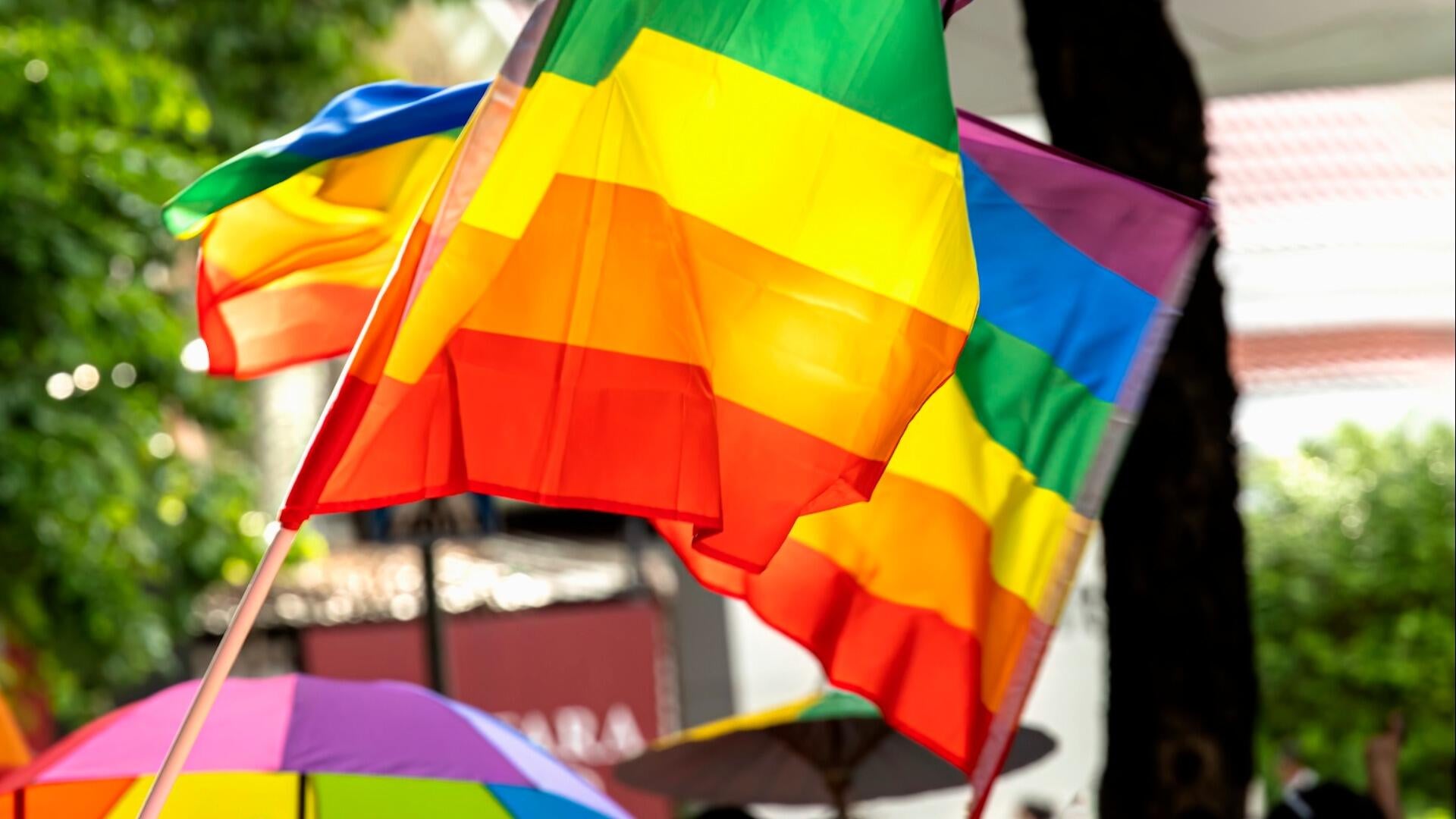
With rainbow flags flying high, tens of thousands of LGBTQ Hungarians and their supporters took to the streets of Budapest for a Pride parade, defying a government ban and Prime Minister Viktor Orbán's legal threats against activists.
Organizers for the 30th edition of the Pride march in the Hungarian capital said they expect a record turnout of more than 35,000 people.
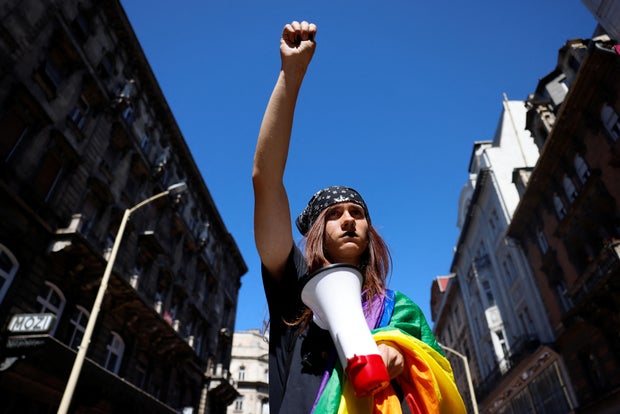 A person attends the Budapest Pride March in Budapest, Hungary, June 28, 2025.
Lisa Leutner / REUTERS
A person attends the Budapest Pride March in Budapest, Hungary, June 28, 2025.
Lisa Leutner / REUTERS
"This is about much more, not just about homosexuality, .... This is the last moment to stand up for our rights," Eszter Rein Bodi, one of the marchers, told Reuters.
"None of us are free until everyone is free," one sign read.
Orbán's populist party in March fast-tracked a law through parliament that made it an offense to hold or attend events that "depict or promote" homosexuality to minors aged under 18. Orbán earlier made clear that Budapest Pride was the explicit target of the law.
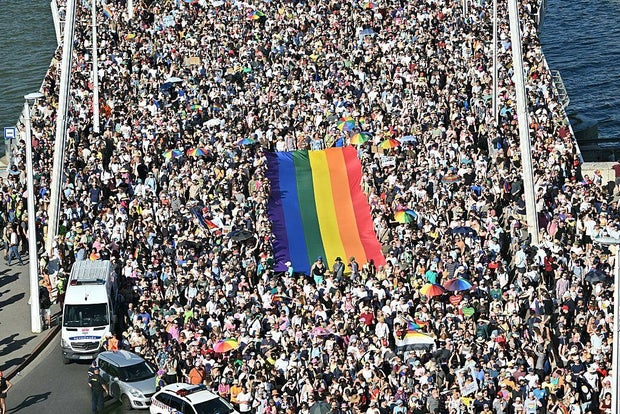 People carry a Rainbow flag as they take part in the Budapest Pride parade in downtown Budapest on June 28, 2025.
ATTILA KISBENEDEK/AFP via Getty Images
People carry a Rainbow flag as they take part in the Budapest Pride parade in downtown Budapest on June 28, 2025.
ATTILA KISBENEDEK/AFP via Getty Images
Hungary's recent law allows authorities to use facial recognition tools to identify individuals who attend a prohibited event. Being caught could result in fines of up to 200,000 Hungarian forints ($586). Organizers face up to one year in prison.
But on Friday, Pride organizers, along with Budapest Mayor Gergely Karácsony, European Commissioner Hadja Lahbib and Vice President of the European Parliament Nicolae Stefanuta, said the march will take place Saturday despite official threats of heavy fines for participants and even jail time for the liberal mayor.
"The government is always fighting against an enemy against which they have to protect Hungarian people ... This time, it is sexual minorities that are the target," Karácsony told a news conference. "We believe there should be no first and second class citizens, so we decided to stand by this event."
Participants on Saturday remained defiant.
"I am proud to be gay... and I am very scared that the government wants to bring us down. I am very surprised that there are so many people, I want to cry," a 66-year-old participant, who gave only his first name, Zoltan, told AFP.
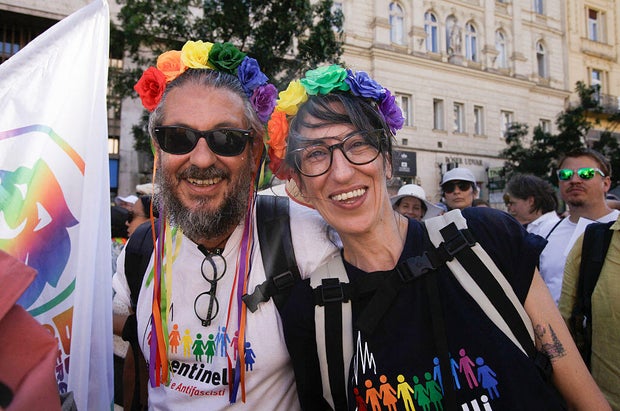 People pose for a photographer as they take part in the Budapest Pride parade in downtown Budapest on June 28, 2025.
PETER KOHALMI/AFP via Getty Images
People pose for a photographer as they take part in the Budapest Pride parade in downtown Budapest on June 28, 2025.
PETER KOHALMI/AFP via Getty Images
One woman told CBS News partner BBC she was attending because she wants a country of "diversity" for her children.
"We have a law that bans people who are different from others to gather. This is why we are here. Because it's hurting our rights. That's why we came," Luca, 34, said.
She told the BBC she is worried about her 4-year-old daughter's future living "in a country where she can't love anyone she wants to."
Critics of the Pride ban and other Hungarian legislation targeting LGBTQ+ communities say the policies are reminiscent of similar restrictions against sexual minorities in Russia.
Orbán, seen as Russian President Vladimir Putin's closest ally in the European Union, has in recent years prohibited same-sex adoption and banned any LGBTQ+ content, including in television, films, advertisements and literature that is available to minors.
His government argues that exposure to such content negatively affects children's development. But opponents say the moves are part of a broader effort to scapegoat sexual minorities and consolidate his conservative base.
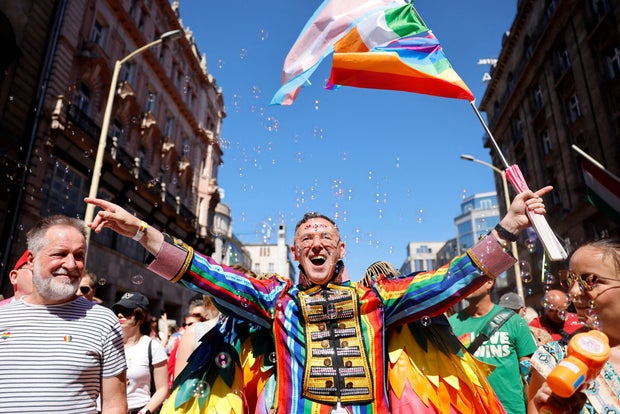 People attend The Budapest Pride March in Budapest, Hungary, June 28, 2025.
Lisa Leutner / REUTERS
People attend The Budapest Pride March in Budapest, Hungary, June 28, 2025.
Lisa Leutner / REUTERS
Speaking to state radio on Friday, Orbán downplayed the possibility of violent clashes between police and participants, but warned that attending Pride "will have legal consequences."
"Of course, the police could break up such events, because they have the authority to do so, but Hungary is a civilized country, a civic society. We don't hurt each other," he said.
More than 70 members of the European Parliament, as well as other officials from countries around Europe, are expected to participate in Saturday's march.
Lahbib, the European Commissioner, said Friday that "all eyes are on Budapest" as Pride marchers defy the government's ban.
"The EU is not neutral on hate," she said. "We cannot stay passive. We cannot tolerate what is intolerable."
Counter demonstrations
On Thursday, radical right-wing party Our Homeland Movement announced it had requested police approval to hold assemblies at numerous locations across the city, many of them on the same route as the Pride march.
A neo-Nazi group said it too would gather Saturday at Budapest City Hall, from which the Pride march is set to depart. The group declared that only "white, Christian, heterosexual men and women" were welcome to attend its demonstration.
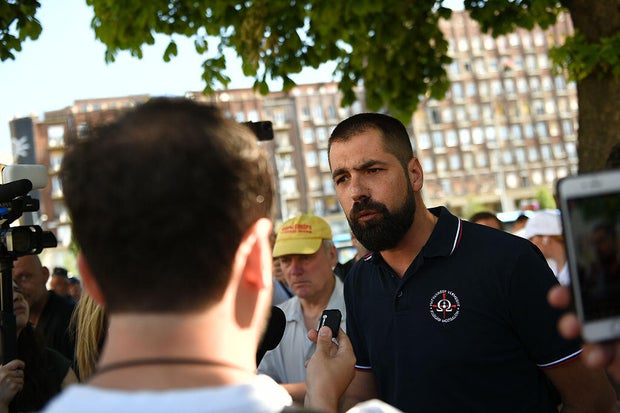 A spokesman of a far-right Hungarian organization speaks to journalists at their protest in the same place as the 30th Budapest Pride March in Budapest, Hungary, on July 28.
Balint Szentgallay/NurPhoto via Getty Images
A spokesman of a far-right Hungarian organization speaks to journalists at their protest in the same place as the 30th Budapest Pride March in Budapest, Hungary, on July 28.
Balint Szentgallay/NurPhoto via Getty Images
A woman, who only gave her first name as Katalin, told AFP on Saturday she agreed with the ban though she hoped there would be no clashes.
"Disgusting... it's become a fad to show off ourselves," she said.











 English (US) ·
English (US) ·